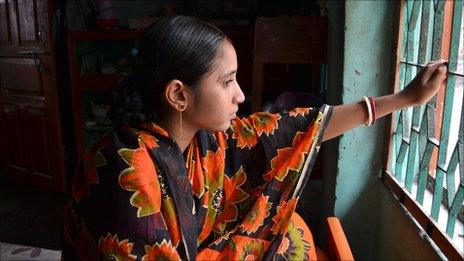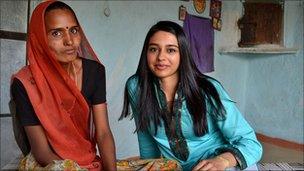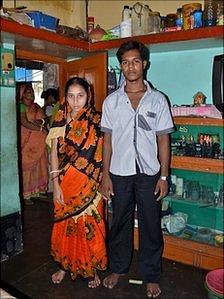What is it like to be a child bride?
- Published

Millions of girls across the world end up as child brides, despite the practice being outlawed in many countries. But some girls are defying their families' attempts to marry them off.
Some 10 million girls a year are married off before the age of 18 across the world, according to a Unicef report released this year.
Just last month South Africa's Archbishop Desmond Tutu, at the launch of the Girls Not Brides global initiative described child marriage as a "practice that robs millions of girls of their childhood, their rights and their dignity".
Both of my grandmothers and my aunt had had child marriages in my native Afghanistan. But their marriages were considered normal, even happy, by my family - so I decided to visit India and Bangladesh, which have some of the highest levels of under-age marriage in the world to get some understanding of what it was really like to be child bride.

Mamta - left with Nel - regrets not having been able to carry on her education
Some 40% of the world's child marriages take place in India. In the northern state of Rajasthan I witnessed the wedding of two sisters who were about six and 11 years old.
As older female relatives fussed over them - dressing them in sparkly red-and-gold outfits and applying full bridal make-up - the brides, like obedient children, quietly went along with it all.
Child marriages are illegal in India, and are punishable with a fine of Rs100,000 (£1,300) and two years in prison for anyone who performs, conducts or negligently fails to prevent a child marriage. But this didn't seem to bother any of the guests who danced merrily or the priest who solemnly chanted the wedding rites.
The brides' grandfather complained: "I hate the government for trying to stop us. This is the way we've always done things. The government bans this, saying do not get under-aged children married, but we don't care and we do these weddings anyway."
Dinesh Sharma, a local non-governmental organisation worker, explained that in remote villages child marriage is usually fully supported by the entire community, and it is rare for someone to inform the police so they can be stopped.
While child brides in Rajasthan tend to be married off very young, it is usually to grooms of a similar age and it is not until they are older, about 15 or 16, that they actually start living together as man and wife.
Even so, being married so young does limit their opportunities.
Rukhmani, a 26-year-old mother of two, was married at six years old and started living with her husband when she was 15. "Had I been married later, I'd have learned to read and write," she says. "If I'd studied, I wouldn't have had to work in the scorching heat, harvesting in the fields."
Mamta, another child bride, also regretted not being able to study, which she felt would have given her a chance to be independent. Instead, she'd felt she had no option but to endure regular beatings from her husband.
According to a study by The International Center for Research on Women (ICRW), girls in some Indian states who were married before 18, were twice as likely to report being beaten, slapped or threatened by their husbands than girls who married later.
Being forced into early marriage is one of the biggest obstacles to getting an education. For field workers of one small NGO in Rajasthan, Shiv Shiksha Samiti, encouraging girls to refuse marriage and stay on in school is crucial.
They helped 14-year-old Roshan Bairwa to find the confidence to say no to her parents' wishes and demand to stay on in school.
"Since I took a stand, not a single girl has been married off in my village," Roshan proudly told me. But Shivji Ram Yadav of Shiv Shiksha admitted the availability of a free local secondary school was key to convincing Roshan's family.
Neighbouring Bangladesh has the highest rate of child marriage in South Asia and the fourth highest in the world, despite child marriage being illegal here, too. In Bangladesh, young girls are married off soon after reaching puberty and usually move in with their husbands straight away.
Seema, aged 14, married and moved in with her 19-year-old husband a year ago. Her life now is radically different to her carefree childhood.

This girl was 14 when she married her 19-year-old husband
"After marriage, what is my work now? Washing dishes, cleaning the floor, washing clothes and cooking," she said.
Seema is now four months pregnant and overwhelmed. "Before I was a kid, and now I'm having a kid. Of course it's scary."
Farah Kabir, country director of Action Aid Bangladesh, explained that with a significant part of the population living below the poverty line, the priority for many families is to get their daughter or sister married off as soon as possible to a man who could provide for her even if he was much older.
One solution for some Bangladeshi girls is to start working in the country's garment industry. There, they earn a wage that can give them economic freedom and the confidence to reject early marriage.
Munni refused to be married off at 13 and found work sewing instead. "I don't think my parents want to marry me off now," she told me. "They think, 'Our daughter makes a lot of money, and she is helping us'."
Whether it is free education, or earning their own wage, the young girls I met needed options to convince their families not to marry them off.
But in reality, these options are not always available. Until the laws banning child marriage are properly enforced, young girls will remain vulnerable.
The Truth About Child Brides was broadcast on BBC Three on Monday 3 October. You view the programme via the iPlayer.
- Published7 June 2011
- Published23 December 2010
- Published4 August 2010
- Published2 June 2010